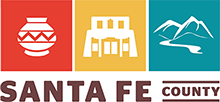Convenience Center Locations
NEW Convenience Center Operating Hours
All Convenience Centers are open 8:00am to 5:00pm, year round.
For more information: www.santafecountynm.gov (select public works, solid waste and your topic)
| Convenience Center | Sunday | Monday | Tuesday | Wednesday | Thursday | Friday | Saturday |
| Eldorado | CLOSED | CLOSED | OPEN | OPEN | OPEN | OPEN | OPEN |
| Jacona | CLOSED | CLOSED | OPEN | OPEN | OPEN | OPEN | OPEN |
| La Cienega | CLOSED | CLOSED | OPEN | OPEN | OPEN | OPEN | OPEN |
| Nambe | CLOSED | CLOSED | OPEN | CLOSED | CLOSED | OPEN | OPEN |
| San Marcos | CLOSED | CLOSED | OPEN | CLOSED | CLOSED | OPEN | OPEN |
| Stanley | CLOSED | CLOSED | OPEN | OPEN | OPEN | OPEN | OPEN |
| Tesuque | CLOSED | CLOSED | CLOSED | OPEN | OPEN | CLOSED | OPEN |
Convenience Center Services
Residential trash, household recycling, and green waste¹ may be brought to any convenience center. Other services vary by convenience center as outlined below.
| Convenience Center | Small Commercial Trash² |
Brush and Tree Waste³ | Appliances & Scrap Metal |
Automotive Fluids | Ashes | Recycling |
| Eldorado | NO | YES | YES | YES | YES | YES |
| Jacona | NO | YES | YES | NO | YES | YES |
| La Cienega | NO | NO | YES | NO | YES | YES |
| Nambe | NO | NO | YES | YES | NO | YES |
| San Marcos | NO | NO | YES | YES | NO | YES |
| Stanley | NO | YES | YES | YES | NO | YES |
| Tesuque | YES | NO | NO | NO | NO | YES |
| ¹Green waste means weeds, grass clippings, and leaves. ²Less than 850 pounds per month ³Brush and tree waste means wood chips and vegetative matter that does not qualify as green waste. |
Convenience Center Rules
- Customers must be residents of Santa Fe County.
- Loads greater than 15 cubic yards are not accepted and are accepted at the Buckman Road Recycling and Transfer Station.
- All loads must be covered and/or secured.
- All garbage must be bagged. Recyclables should be loose but covered and/or secured.
- All recyclable material must be placed in proper bins.
- Children and pets must remain in vehicles at all times.
- Brush and green waste must be no longer than 6 feet long and 18” in diameter.
- Rims must be removed from tires.
- No more than eight tires per month are accepted.
- Only residents may bring automotive fluids and tires.
- The unauthorized searching through and/or taking of anything from discarded solid waste or recyclable materials is prohibited.
Arriving at a convenience center with an uncovered load will result in the assessment of two additional permit punches and/or a citation. If found guilty, the criminal penalty shall be a fine of at least $50 for the first offense, $100 for the second offense, and $100-$200 for the third offense. Arriving with unbagged trash will result in the assessment of one additional permit punch and/or a citation. If found guilty, the criminal penalty shall be a fine of at least $25 for the first offense, $50 for the second offense, and $100 for the third offense.
Prohibited Materials
See Ordinance# 2014-10 for definitions. For guidance on handling prohibited materials, contact us.
|
|
